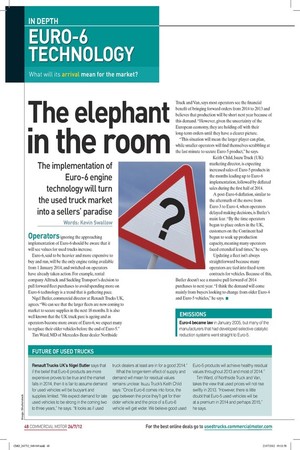The elephant
Page 38

If you've noticed an error in this article please click here to report it so we can fix it.
in the room
The implementation of Euro-6 engine technology will turn the used truck market into a sellers’ paradise
Words: Kevin Swallow
Operators ignoring the approaching implementation of Euro-6 should be aware that it will see values for used trucks increase.
Euro-6, said to be heavier and more expensive to buy and run, will be the only engine rating available from 1 January 2014, and switched-on operators have already taken action. For example, rental company Alltruck and Suckling Transport’s decision to pull forward leet purchases to avoid spending more on Euro-6 technology is a trend that is gathering pace.
Nigel Butler, commercial director at Renault Trucks UK, agrees. “We can see that the larger leets are now coming to market to secure supplies in the next 18 months. It is also well known that the UK truck parc is ageing and as operators become more aware of Euro-6, we expect many to replace their older vehicles before the end of Euro-5.” Tim Ward, MD of Mercedes-Benz dealer Northside Truck and Van, says most operators see the inancial beneit of bringing forward orders from 2014 to 2013 and believes that production will be short next year because of this demand. “However, given the uncertainty of the European economy, they are holding off with their long-term orders until they have a clearer picture.
“This situation will mean the larger player can plan, while smaller operators will ind themselves scrabbling at the last minute to secure Euro-5 product,” he says.
Keith Child, Isuzu Truck (UK) marketing director, is expecting increased sales of Euro-5 products in the months leading up to Euro-6 implementation, followed by delated sales during the irst half of 2014.
A post-Euro-6 delation, similar to the aftermath of the move from Euro-3 to Euro-4, when operators delayed making decisions, is Butler’s main fear. “By the time operators began to place orders in the UK, customers on the Continent had begun to soak up production capacity, meaning many operators faced extended lead times,” he says.
Updating a leet isn’t always straightforward because many operators are tied into ixed-term contracts for vehicles. Because of this, Butler doesn’t see a massive pull forward of 2014 purchases to next year. “I think the demand will come mainly from buyers looking to change from older Euro-4 and Euro-5 vehicles,” he says. ■
EMISSIONS
Euro-4 became law in January 2005, but many of the manufacturers that had developed selective catalytic reduction systems went straight to Euro-5.









































